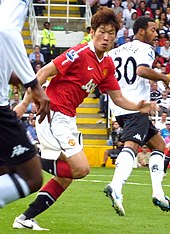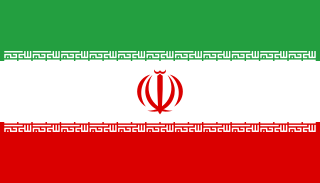
The Iran national football team, recognised by FIFA as IR Iran, represents Iran in international senior football and is governed by the Football Federation Islamic Republic of Iran (FFIRI).
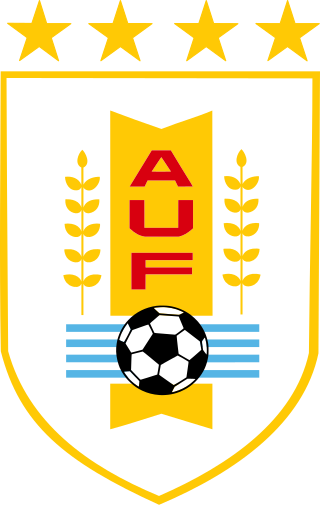
The Uruguay national football team represents Uruguay in international men's football, and is administered by the Uruguayan Football Association, the governing body for football in Uruguay. The national team is commonly referred to as La Celeste. They have a long history of “punching above their weight”, often defeating the teams of countries much more populous than Uruguay.
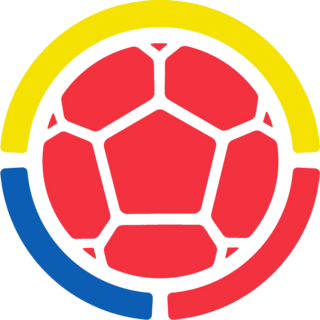
The Colombia national football team represents Colombia in men's international football and is managed by the Colombian Football Federation, the governing body for football in Colombia. They are a member of CONMEBOL and are currently ranked 14th in the FIFA World Rankings. The team are nicknamed Los Cafeteros due to the coffee production in their country. The national team has been a symbol of nationalism, pride and passion for many Colombians worldwide. Colombia is known for having a passionate fan base, and the team's dances during goal celebrations have been symbolic.

The Switzerland national football team represents Switzerland in men's international football. The national team is controlled by the Swiss Football Association.
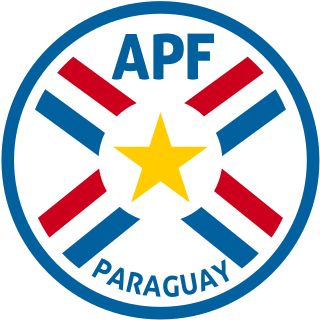
The Paraguay national football team represents Paraguay in men's international football competitions, and are controlled by the Paraguayan Football Association. Paraguay is a member of CONMEBOL. Their nickname is the Albirroja, or red and white. The Albirroja has qualified for eight FIFA World Cup competitions, with their best performance coming in 2010 when they reached the quarter-finals. A regular participant at the Copa América, Paraguay have been crowned champions of the competition on two occasions. Paraguay's highest FIFA World Rankings was 8th and their lowest was 103. Paraguay was awarded second place with Best Move of the Year in 1996 for their rise in the FIFA Rankings.

The Japan national football team, also known by the nickname Samurai Blue, represents Japan in men's international football. It is controlled by the Japan Football Association (JFA), the governing body for football in Japan.

The Venezuela national football team represents Venezuela in men's international football and is controlled by the Venezuelan Football Federation (FVF), the governing body for football in Venezuela. They are nicknamed La Vinotinto. When playing at home in official games, they usually rotate between three stadiums: The Polideportivo Cachamay in Puerto Ordaz, the Estadio José Antonio Anzoátegui in Puerto La Cruz and the Estadio Pueblo Nuevo in San Cristóbal. In friendly matches, they tend to rotate between the rest of the stadiums in the country.

The South Africa men's national soccer team represents South Africa in men's international soccer and it is run by the South African Football Association, the governing body for Soccer in South Africa. The team's nickname is Bafana Bafana, and South Africa's home ground is FNB Stadium, which is located in Johannesburg. The team's greatest result was winning the Africa Cup of Nations at home in 1996. The team is a member of both FIFA and Confederation of African Football (CAF). The team remains one of the best teams on the continent.

The South Korea national football team represents South Korea in men's international football and is governed by the Korea Football Association. South Korea has emerged as a major football power in Asia since the 1980s, having participated in ten consecutive and eleven overall FIFA World Cup tournaments, the most for any Asian country. Despite initially going through five World Cup tournaments without winning a match, South Korea became the first Asian team to reach the semi-finals when they co-hosted the 2002 tournament with Japan. South Korea also won two AFC Asian Cup titles, and finished as runners-up on four occasions. Furthermore, the team won three gold medals and three silver medals at the senior Asian Games.

The North Korea national football team represents North Korea in men's international football and it is controlled by the DPR Korea Football Association, the governing body for Football in North Korea. The team represents both FIFA and Asian Football Confederation (AFC).

The Lebanon national football team, controlled by the Lebanese Football Association (LFA), have represented Lebanon in association football since their inception in 1933. The squad is governed by the Asian Football Confederation (AFC) continentally, and FIFA worldwide. While Lebanon have yet to qualify for the FIFA World Cup, they have qualified three times to the AFC Asian Cup: they first participated in 2000, when they hosted the event. Lebanon's main venue is the Camille Chamoun Sports City Stadium in Beirut; however they also play in other locations such as the Saida Municipal Stadium in Sidon.
The FIFA World Cup was first held in 1930, when FIFA, the world's football governing body, decided to stage an international men's football tournament under the era of FIFA president Jules Rimet who put this idea into place. Jules Rimet was the president of FIFA from 1921 to 1954. Rimet was appreciated so much for bringing the idea of FIFA to life that 1946 the trophy was named the Jules Rimet Cup instead of the World Cup Trophy. The inaugural edition, held in 1930, was contested as a final tournament of only thirteen teams invited by the organization. Since then, the World Cup has experienced successive expansions and format remodeling, with its current 48-team final tournament preceded by a two-year qualifying process, involving over 200 teams from around the world.

Óscar Washington Tabárez Silva, known as El Maestro, is a Uruguayan former professional football manager and former player.
Association football is the most popular sport in nearly every African country, and thirteen members of the Confederation of African Football (CAF) have competed at the sport's biggest event – the FIFA World Cup.

Nine of ten members of the South American Football Confederation (CONMEBOL) have competed in the men's FIFA World Cup finals. National association football teams from CONMEBOL have won the tournament ten times, including Brazil's record five championships. CONMEBOL countries have hosted the finals five times.
Association football is the most popular sport in almost all North, Central American and Caribbean countries, and eleven members of the Confederation of North, Central American and Caribbean Association Football, CONCACAF, have competed at the sport's biggest event – the men's FIFA World Cup.
This is a record of the Israel national team's results at the FIFA World Cup. They have qualified for the tournament on one occasion, in 1970. Israel qualified for the 1970 World Cup as an Asian team. Nowadays Israel competes in the European zone, as well as a full member of UEFA since the 1990s.
Association football is among the most popular sports in Asia, with 13 members of the Asian Football Confederation having competed at the sport's biggest international event, the men's FIFA World Cup. The highest ranked result in the World Cup for an Asian team is 4th place in the 2002 FIFA World Cup by South Korea.
This article is about the history of South Korean national football teams, including youth and women's teams.
This article shows a summary of the 2018 football season in South Korea.

